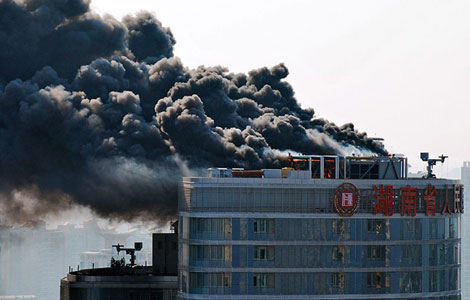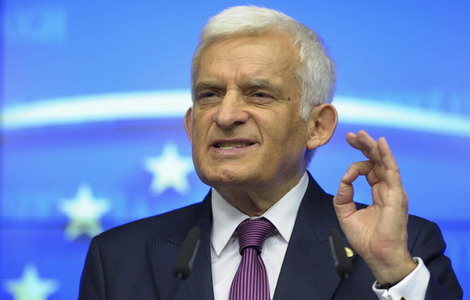Drone crash unmasks US spying effort in Iran
Updated: 2011-12-10 16:57
(Agencies)
|
|||||||||||
* Drone was conducting surveillance over Iran
* ISIS says explosion near Isfahan, not a nuclear site
WASHINGTON - The crash of a CIA drone in Iran has brought into the open what US intelligence agencies would prefer kept secret: intense spying efforts in a country where the United States has no official presence.
Iran on Thursday aired with great flourish footage of the captured drone, which appeared largely intact. Pentagon and CIA spokesmen would not comment on whether it was the missing US RQ-170 Sentinel unmanned aircraft.
A person familiar with the situation confirmed that the drone that crashed was on a surveillance mission over Iran.
It is believed to have crashed because of a malfunction and not from being shot down or computer-hacked by the Iranians, a US official said on condition of anonymity.
Although there are risks that Iran could attempt to reverse engineer the technology, or sell it to other countries, like China, US officials believe that Iran will not be able to mine the drone's computer systems to learn details of the US surveillance mission.
US surveillance of Iran through various means has been going on for years, US officials and others with direct knowledge of the situation say.
A private US defense expert, who spoke on condition of anonymity, said that when he visited the command center at a US military base in the Gulf region in 2008, it was clear that the installation was receiving multiple feeds of electronic surveillance information from inside Iran.
Some of the information appeared to be transmitted from high-altitude aircraft and some from electronic sensors which the United States had somehow installed on the ground in Iran, the expert said.
The United States has no official presence in Iran so it is difficult to determine exactly what is going on inside its borders. One recent incident has yet to be fully unraveled.
EXPLOSION IN ISFAHAN
On November 28, there were contradictory reports out of Iran on whether an explosion had occurred in the city of Isfahan, which is also home to a major nuclear site.
David Albright, president of the Institute for Science and International Security, said he has been studying imagery of that area and no damage was detected at the Isfahan nuclear site. But, he said, "it is credible there was an explosion, but not at the nuclear site."
He said it was puzzling that Iranians clearly said an explosion at a missile depot two weeks earlier had been an accident, but did not provide similar clarity about Isfahan. "We're trying to figure out what actually happened," he said.
"Explosions are happening in Iran, and Iran is not making a big deal out of them. They are either calling them accidents or saying they didn't happen, and therefore when these things continue to happen it could be because intelligence agencies are actually now playing sabotage," Albright said.
In the earlier November 12 incident, Iran said a massive blast at a military base west of Tehran killed 17 members of the elite Islamic Revolutionary Guards Corps, including the head of its missile program, in an accident while weapons were being moved.
When unexplained events occur that appear to be aimed against Iran's nuclear program, experts often question whether US and Israeli intelligence services were at work.
Iran also has had alleged covert operations against the West come to light. Recently, the United States arrested a man accused of being involved in a plot by Iranian agents to kill Saudi Arabia's ambassador to Washington.
The US government also accuses Iran of arming and funding Iraqi militias responsible for attacking American troops in Iraq.
US officials do not appear to be the least bit disturbed about mishaps to Iran's nuclear and missile programs that include the Stuxnet computer virus that attacked centrifuges at the Natanz nuclear site.
"Whether it's due to technical difficulties, incompetence, or other reasons, some setbacks to Iran's activities are welcome," a US official said on condition of anonymity.
Hot Topics
HIV/AIDS, Egypt protest, Thanksgiving, climate change, global economic recovery, home prices, high-speed railways, school bus safety, Libya situation, Weekly photos
Editor's Picks

|

|

|

|

|

|






